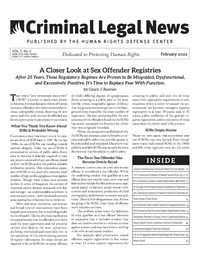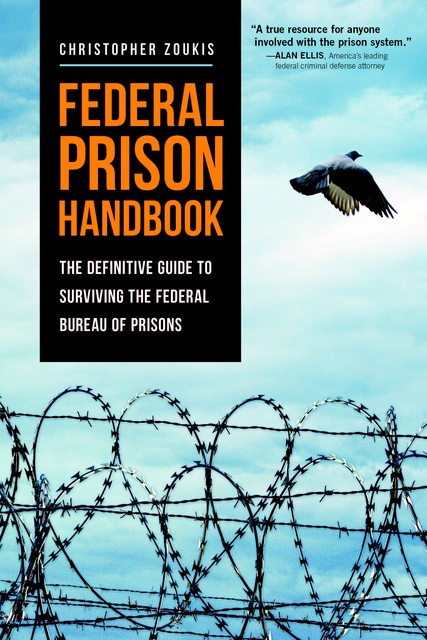After 25 Years, These Regulatory Regimes Are Proven to Be Misguided, Dysfunctional, and Excessively Punitive. It’s Time to Replace Fear With Function.
by Casey J. Bastian
The term “sex offender registry” (“SOR”) is known to nearly every person in America. It evokes fantastic visions of human monsters, …
by Dale Chappell
The U.S. Court of Appeals for the Eighth Circuit reiterated that it is the statute of conviction that determines First Step Act relief under the retroactive application of the Fair Sentencing Act of 2010 (“FSA”), not the defendant’s actual conduct or drug amount involved.
…
by James M. Doyle, The Crime Report
After 50 years of representing indigent defendants in urban criminal courts I have no objection to seeing prosecutors disciplined for their misconduct.
As a matter of fact, I find the prospect delectable.
But during those same 50 years I …
by David M. Reutter
The Supreme Court of California issued an order that set the standard of review for motions filed under Penal Code § 1473.7 (Motion to vacate conviction or sentence by person no longer imprisoned or restrained). It then reviewed the motion on appeal and found …
by Anthony W. Accurso
In a case of first impression, the Supreme Court of Idaho held that the automobile exception to the warrant requirement applies only to containers located inside the vehicle at the time probable cause arises to search containers thereunder.
Diasha Lynn Maloney was pulled-over …
by Anthony W. Accurso
The Court of Criminal Appeals of Texas upheld the decision of a lower court to suppress a defendant’s surreptitiously recorded statements on the ground that it was not properly “warned and waived” under Texas law.
Erlinda Lujan was arrested by El Paso police …
by Dale Chappell
The U.S. Court of Appeals for the Sixth Circuit held that enhancements under the U.S. Sentencing Guidelines (“USSG”) that were applied to all three counts of conviction that were ungrouped were impermissible triple counting, and contradicted the intent of the Guidelines’ grouping instructions.
Jermaine …
by Douglas Ankney
The Supreme Court of the United States (“SCOTUS”) reversed a decision of the U.S. Court of Appeals for the Tenth Circuit that had reversed the U.S. District Court for the Eastern District of Oklahoma’s finding of qualified immunity for police officers who shot and killed …
by Douglas Ankney
The California Court of Appeal, Second District, held that a trial court is bound to provide notice and consider information provided by the parties before ruling on a California Department of Correction and Rehabilitation (“CDCR”) recommendation to recall a prisoner’s sentence pursuant to California Penal …
by Casey J. Bastian
In February 2018, New Jersey Governor Phil Murphy convoked the Criminal Sentencing and Disposition Committee (“CSDC”) to analyze the state’s sentencing laws. The CSDC was tasked with providing specific recommendations “to ensure a stronger, fairer, and more just state.” The CSDC’s initial annual report …
by Douglas Ankney
The U.S. Court of Appeals for the Seventh Circuit clarified the standard of review for revocation of bond when the arrestee is alleged to have violated conditions of release.
Lashawn Wilks was arrested on numerous serious offenses, including conspiracy to distribute methamphetamine. He was …
by Douglas Ankney
The Supreme Court of Kansas held that Brooke Dinkel’s trial counsel, Roger Strubel, was ineffective because he failed to request a jury instruction on the voluntary act requirement in a prosecution for rape of a child under 14 years of age where the defense argued …
by Dale Chappell
Acknowledging a circuit split on the issue, the U.S. Court of Appeals for the Sixth Circuit held that district courts have the authority to waive interest on restitution post-sentencing.
Edmund Phillips was nearing release and filed a motion in the U.S. District Court for …
by Dale Chappell
The U.S. Court of Appeals for the Third Circuit affirmed the grant of habeas corpus relief to a death-sentenced defendant based on the fact the state courts’ application of the governing federal law was objectively unreasonable regarding the defendant’s Sixth Amendment choice-of-counsel right.
It …
by Douglas Ankney
The Supreme Court of Idaho vacated Patricia Ann Amstutz’s conviction for misdemeanor driving under the influence of alcohol (“DUI”) because her alleged offense was completed outside the arresting officer’s presence.
Officer Kale White was dispatched to the address of Amstutz after someone reported Amstutz …
by Douglas Ankney
The U.S. Court of Appeals for the Second Circuit announced that for purposes of the defense of entrapment, the defendant has the burden to produce some “credible evidence” that the government induced him to commit the crime.
John E. Cabrera was charged with two …
by David M. Reutter
When Nervin Coronado was charged in 2009 with participating in a mortgage fraud scheme, he faced more than just prison time. He faced deportation because he immigrated to the U.S. at the age of 12 and never became a U.S. citizen.
Like others …
by Anthony W. Accurso
Two relatively new types of warrants are causing a stir among privacy advocates and defense attorneys who claim the warrants are overbroad and jeopardize the spirit of the Fourth Amendment’s protections.
“Geofence” or “reverse” warrants involve police obtaining a warrant to obtain location …
by Douglas Ankney
The Court of Appeal, Sixth Appellate District, held that a trial court has authority to deny a request for a continuance of a motion to suppress under California Penal Code § 1050(e) even if the decision may foreseeably result in dismissal of the prosecution. (All …
by Douglas Ankney
Thermo Fisher Scientific’s Applied Biosystems Rapid HIT ID DNA Booking System was approved by the FBI for use by law enforcement booking stations to automatically process, upload, and search DNA reference samples from qualifying arrestees against the U.S. National DNA Index System (“NDIS”) database.
…
by Anthony W. Accurso
The U.S. Court of Appeals for the Tenth Circuit ordered the suppression of evidence discovered during the impounding of a vehicle where the impoundment was for the sole purpose of searching for evidence of a crime.
Tulsa police received a call with a …
by Douglas Ankney
In a case of first impression, the Supreme Court of Pennsylvania held that a driver who leaves the scene of an accident involving death or personal injury before being statutorily excused may be punished for only one violation of 75 Pa.C.S. § 3742 (requiring driver …
by Jayson Hawkins
Lawrence Montoya was only 14 years old back in 2000 when Denver cops accused him of being involved in the murder of Emily Johnson, a local teacher. During the first two hours of interrogation, Montoya refuted detectives’ allegations of his presence at Johnson’s house over …
by Jayson Hawkins
Devantee Jones-Bernier did not have any drugs on him when police executed a search warrant on the apartment where he was visiting some friends in Worcester, Massachusetts. Marijuana was found in the unit, and so Jones-Bernier was initially charged along with everyone else there. Police …
by Casey J. Bastian
There are not many people who can truly relate to the Kafkaesque experience of the three men currently stuck in the Missouri prisons. All three are factually innocent but have spent decades behind bars. Christopher Dunn, Kevin Strickland, and Lamar Johnson have each spent …
by Casey J. Bastian
ShotSpotter markets technology that uses microphone sensors to detect the specific acoustic signature of gunshots and then record the time and location of the signature it detects. The technology can also detect firecrackers, car backfire, and other similar sounds—not just gunshots. It is up …
by Jacob Barrett
On June 7, 2021 the Oregon Legislature passed HB 3355 establishing identification requirements for law enforcement assigned to “crowdmanagement” events in which large crowds of 50 persons or more are managed to prevent the outbreak of crowd crushes, affrays, fights, or riots. (The bill carves …
by Casey J. Bastian
In a first-of-its-kind study, renowned cognitive bias expert Itiel Dror and co-author Nina Surnde researched the reliability and biasability (the impact of contextual information) of digital forensics (“DF”) experts’ performance. The study is titled “A hierarchy of expert performance (HEP) applied to digital forensics: …
by Casey J. Bastian
More than a year after the killing of George Floyd, an explosion of protests led to an emphasis being placed on changing the way we police our communities. “The systems we’ve got right now in some ways are fundamentally incapable of delivering safety in …
by Ashleigh N. Dye
In August 2021, North Carolina Governor Roy Cooper signed three criminal justice bills into law. The goals of the new laws are to give law enforcement the mental health tools they need, ensure police are responsible for their actions, and log the trouble officers …
by Jayson Hawkins
Orwell’s warning that “Big Brother is watching” has hung over western society for decades, sometimes confirmed by revelations of unauthorized government wiretaps, sometimes rendered ridiculous by the paranoid rantings of conspiracy theorists. In the post-9/11, cyberspace driven, the Patriot Act world of Edward Snowden and …
by Casey J. Bastian
In any emergency, Americans have been conditioned to call 911. Those three digits are typed into a phone by someone experiencing a critical situation around 240 million times per year. Despite its universal familiarity, the 911 system has existed for only 53 years. While …
by David M. Reutter
The U.S. Court of Appeals for the District of Columbia Circuit held that a plea agreement was ambiguous as to the Government’s ability to oppose Safety Valve relief on grounds the defendant was a supervisor or manager in a drug conspiracy. It ordered resentencing …
by Dale Chappell
The U.S. Court of Appeals for the Eleventh Circuit held that because the defendant was convicted of an aggravated assault with a deadly weapon in Georgia under a statute that could be violated with a mens rea of mere reckless conduct, it could not qualify …
by Dale Chappell
Any proactive measure to cut down on cops shooting motorists is a good step in the right direction. At first glance, what the Minnesota Department of Public Safety (“MDPS”) is doing sounds like a great idea. They’re handing out pouches that motorists can use to …
Loaded on
Jan. 15, 2022
published in Criminal Legal News
February, 2022, page 50
Arizona: The family of a homeless and mentally ill man who died after being restrained by Phoenix cops in 2017 will get $5 million from the city, after a 7-2 city council vote in favor of the payment on November 17, 2021, according to a report by local TV …






